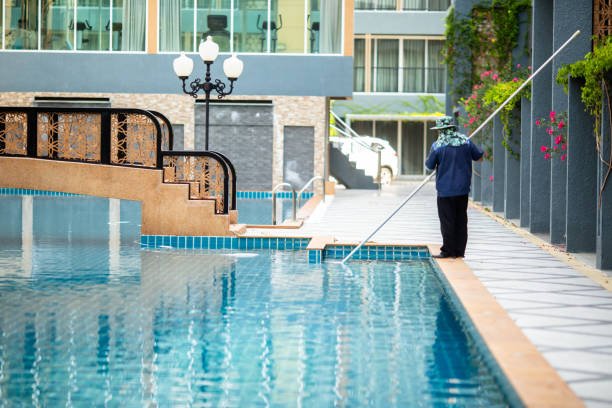Swimming Pool Maintenance: Essential Tips & Guide
Learn essential swimming pool maintenance tips to keep your pool clean, safe, and long-lasting. Get expert guidance on cleaning, balancing chemicals, and seasonal care.

Introduction
A well-maintained swimming pool is a source of relaxation and fun, but it requires regular upkeep to stay clean and safe. Proper swimming pool maintenance prevents algae growth, keeps water balanced, and extends the life of your pool equipment. Whether you own a home pool or manage a commercial one, following a routine maintenance schedule will ensure clear and healthy water all year round.
1. Regular Pool Cleaning
Keeping your pool clean is the first step in proper maintenance. Here’s how to do it:
- Skimming and Debris Removal: Use a skimmer net to remove leaves, insects, and debris daily.
- Brushing the Walls & Tiles: Brush the pool walls and tiles weekly to prevent algae buildup and stains.
- Vacuuming: Use a manual or automatic pool vacuum to remove dirt from the bottom.
Regular cleaning not only keeps the water clear but also prevents bacteria and algae from forming.
2. Water Chemistry Balance
Maintaining the correct chemical levels is crucial for safe and clear water. Test the water at least twice a week using a pool test kit and adjust as needed. The key levels to monitor include:
- pH Level (7.2 – 7.8): Ensures water is neither too acidic nor too alkaline.
- Chlorine (1 – 3 ppm): Keeps bacteria and algae in check.
- Alkalinity (80 – 120 ppm): Helps stabilize pH levels.
- Calcium Hardness (200 – 400 ppm): Prevents corrosion and scaling.
Using high-quality chemicals and keeping water balanced will extend the life of your pool and keep it safe for swimming.
3. Filtration System Maintenance
Your pool’s filtration system is responsible for keeping the water clear and free of impurities. To maintain it:
- Clean the Pool Filter: Whether you have a sand, cartridge, or DE filter, clean or replace it regularly to ensure efficient filtration.
- Backwash the Filter: For sand and DE filters, backwashing helps flush out trapped debris and improves performance.
- Check Pump & Skimmer Baskets: Remove any blockages to keep the water flowing smoothly.
A well-maintained filtration system is the backbone of a clean and healthy pool.
4. Shocking the Pool
Shocking the pool involves adding extra chlorine to kill bacteria and remove contaminants. This should be done:
- After heavy usage (e.g., pool parties)
- Following storms or rain
- If water appears cloudy or has an odor
Use a shock treatment at night to allow it to work effectively without sunlight interference.
5. Seasonal Pool Maintenance
Different seasons require different maintenance approaches:
- Summer: Increase cleaning frequency, check chlorine levels daily, and ensure the filtration system runs efficiently.
- Winter: If closing the pool, lower water levels, add winter chemicals, and cover it properly to prevent damage.
- Spring & Fall: Remove debris, test water, and prepare the pool for temperature changes.
By adjusting your maintenance routine based on the season, you can protect your pool from damage and ensure it’s always ready to use.
6. Professional Pool Inspection
Even with regular maintenance, it’s a good idea to schedule an annual inspection with a professional. They can:
- Detect leaks and structural issues
- Check pump and filtration performance
- Ensure water chemistry is balanced correctly
A professional service helps catch problems early, saving you costly repairs in the long run.
Conclusion
Swimming pool maintenance is essential to keep the water clean, safe, and inviting. By following a routine cleaning schedule, balancing chemicals, maintaining the filtration system, and adjusting care based on the season, you can enjoy a sparkling pool all year long. Whether you handle maintenance yourself or hire a professional, consistent care ensures your pool remains in top condition.
What's Your Reaction?

















